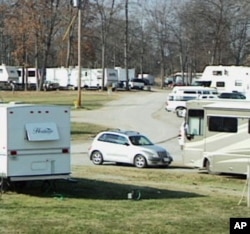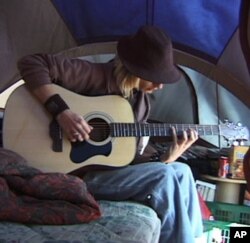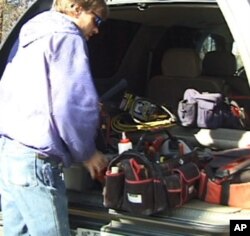Every American neighborhood seems to have one mom to whom all the children gravitate. In a community in the small town of Lebanon, Tennesee, that person is Tammy Renault. But she never expected to be super-mom in this particular neighborhood.
The Renaults are one of more than 20 homeless families currently living in Lebanon's Timberline Campground. Timberline's the kind of place someone with a tent or camper might spend a night; a day or two at most. The Renaults have been here since last August.
From comfortable middle-class to uncertain future
It's a giant step down from the three-bedroom home they lost. Renault says her family's slide into homelessness started nearly two years ago when her husband Troy lost his construction job. "[For] a little under a year," she recalls, "we just kind of maintained living expense. But then it just got to a point where, with the economy shifting, it caused people to no longer really utilize his services."
Troy Renault says when the money got tight, the family started having to make some difficult choices. "You wind up starting to think to yourself, 'Okay. Do we go ahead and make the house payment and keep a roof over our head but have no lights and no water, or do you go ahead and keep those utilities on and forego the house payment, and hope that you can get it caught up?' And it just kept going where it got further and further behind until we wound up losing the home."
The Renaults and four of their five sons are now living in a donated travel-trailer; down from 170 square meters of living space to 20.
Hard lessons
But beyond the physical hardships, Tammy Renault says her family is getting a crash course in what it means, socially, to be labeled homeless. "It's being called names. It's being ridiculed. It's running into people that have seen you in your highest and are not even speaking to you anymore because they're too afraid for where you are and don't know what to say."
Liz Reese recently opened Lebanon's first homeless shelter. She says city leaders initially questioned the need for such a facility, but the shelter's been at capacity every night for the last six months. "I average anywhere from seven to 14 calls a day...people looking for places to go and stay. The way the economy is and job loss, the numbers are increasing." Reese has had to place the overflow in local hotels and at campgrounds like Timberline.
It's a similar story in many communities around the country. The unemployment rate stands at 10 percent, near a 26-year high. Economists predict that the number of Americans who can't pay their mortgage and lose their homes to foreclosure will continue to rise this year. Last year, 860,000 properties were repossessed.
The new face of the homeless
Most Americans imagine the homeless to be from the poorest levels of society, misfits, perhaps alcoholics or drug addicts. Reese says that's generally not the case with the homeless she works with. "There are people out here who have master's degrees and college education and are not high school dropouts. We've had people who came out of $300,000 homes."
That's no surprise to sociologist James Wright of the University of Central Florida. He's made a career of studying America's homeless. He discredits another common misconception of the homeless as shiftless panhandlers. "Most homeless men spend their days either working or at least looking for work, frequently in the day labor outlets," he says. "So there's always been a pretty substantial representation of working poor people among the homeless population and I'm sure, with the current recession, their numbers have increased."
Troy Renault is a perfect example. He does find work occasionally but not often enough to get into a new home. He spends most days repairing things for his campground neighbors without charge. He says he's learned that work has its own reward. "It made it much easier for us to go through the day-to-day because we weren't focused on what was going on with us. We were able to do stuff to, you know, help other people."
A person of faith, Tammy Renault says she's also found something positive about her poor circumstances. "No matter where I am, or what I'm going through, if I just choose to trust God, regardless of how I feel, if I choose to trust God, he'll take care of me."
The Renaults don't see themselves getting out of the campground anytime soon. But they also don't seem to mind quite as much as you might expect. As Troy Renault observes, Americans always seem to be at their best when times are hardest.














